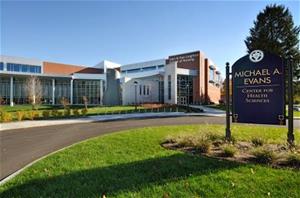 The Marian University College of Osteopathic Medicine (MU-COM) has received a grant for over $300,000 to research rosacea, a common skin disorder, of unknown cause, which causes facial redness and inflammation in about 16 million Americans. The funding is the university’s first from the National Institutes of Health (NIH).
The Marian University College of Osteopathic Medicine (MU-COM) has received a grant for over $300,000 to research rosacea, a common skin disorder, of unknown cause, which causes facial redness and inflammation in about 16 million Americans. The funding is the university’s first from the National Institutes of Health (NIH).
“To be awarded funding from the NIH acknowledges that an innovative and meritorious proposal has been vetted through a rigorous peer-review process and judged to be among the best-of-the-best grant submissions,” Donald Sefcik, dean of MU-COM and vice president of health professions, said.
The research will be led by Kristen Metzler-Wilson, PT, Ph.D., associate professor of neuroscience and pharmacology, and Thad Wilson, Ph.D., professor of physiology. The two will use specialized techniques to directly measure the neurovascular activity of facial skin face in response to flushing triggers. Many triggers of rosacea symptoms are stressors that affect the sympathetic (“fight or flight”) portion of the nervous system, and a recent pilot study by Drs. Metzler-Wilson and Wilson published in the Journal of Neurophysiology suggests there is sympathetic dysfunction in rosacea.
“Rosacea impacts quality of life and what we’re trying to do is address how the disorder starts,” Dr. Metzler-Wilson said. “Once we understand the underlying cause, we can design treatments that hit at the cause rather than just treating the symptoms.”
Marian University is one of the best places in the country to study this aspect of the disorder. Because, as stated by Dr. Wilson, “Our laboratory performs several specialized techniques related to direct in vivo neural recordings which we have helped to pioneer, and we have the only clinical data published in the field.”
Beyond the potential impact for those affected by rosacea, the grant will also bring with it other opportunities for the university. Graduate and undergraduate students in exercise science, biology, chemistry, biomedical sciences, nursing, as well as medical students could potentially perform research as a part of this multi-year research grant. For MU-COM, NIH funding attracts talented faculty and students and lays the groundwork for future research opportunities.
Dr. Metzler-Wilson and Dr. Wilson will work with dermatology partners through the Dawes Fretzin Clinical Research Group. They also partner with staff at the Marian University’s Hill-Rom Simulation Center and with other clinical faculty at MU-COM.
Research is set to begin this summer.